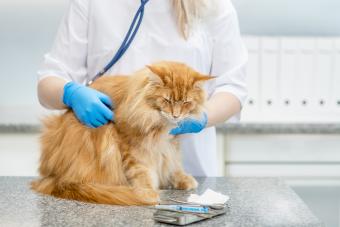
According to the Centers for Disease Control, AKA the CDC, bed bug infestations have increased in the last two decades, leading many loving cat owners to wonder whether bed bugs will feast on their feline. The great news is that bed bugs don't really like to feed on cats. But that doesn't mean they won't hitch a ride to get into your home.

Do Cats Carry Bed Bugs?
The American Veterinary Medical Association notes, "bed bugs are very efficient hitchhikers." While bed bugs don't live on cats the same way fleas do, it is possible for bed bugs to infest areas where your cat may be, including your cat's bed, pet carrier, toys, or even their cat tree. Bed bugs may even get stuck in your cat's fur and get carried into your home that way.
Bed bugs are hardy and can survive anywhere including the local grocery store, hotels, the thrift shop, or even in restaurants.
Do Bed Bugs Bite Cats?
Bed bugs prefer to snack on humans, but they won't say no to a quick bite on our cats or dogs, especially when they're really crowded and super hungry. But here's the thing — they don't hang out on your cat for long. They'll grab a quick snack for a few minutes, usually once it's dark outside, and then dash off to their hiding spots.
What If I Find Bed Bug Bites on My Cat?
Grooming your cat carefully can help remove any bugs that may still be on their fur. Talk to your veterinarian about your concerns and ask them if your cat will need any additional treatments, like a topical ointment on the bites or a steroid to get the swelling down if they had a reaction.

- Your veterinarian may also recommend a medicated shampoo to soothe your cat's skin.
- Don't use any shampoo for bed bugs made for dogs, as these can hurt your cat.
- Check your cat's fur, bedding, and favorite resting spots for more bugs or signs of them, such as tiny black droppings.
- Wash your cat's bedding, toys, and any other items in hot water, then dry on the highest heat setting for at least 30 minutes.
Luckily, bed bug bites won't harm your cat, but their skin could be irritated as the bites heal, and it's possible some cats might have an allergic reaction. You may also see some temporary fur loss near the bites.
Watch out for excessive scratching, redness, or any unusual behavior — bring your kitty to the vet or give them a call if you notice any of these signs.
How Can I Keep My Cat Safe From Bed Bugs?
Indoor/outdoor cats may roam into other homes or areas infested with bed bugs, but the good news is they're unlikely to stay on your cat for long.
Cats, especially those that stay inside, are most likely to encounter a bed bug that is already in your home. The best way to prevent them from getting onto your cat is to follow the U.S. Environmental Protection Agency's suggestions for overall home protection.
Beware of Furniture
Before you bring any type of furniture or bedding into your home that is used, look carefully for evidence of bed bug activity. Check all the nooks and crannies — they may have eggs in the corner of the mattress or the seam of the couch cushions. Or avoid it entirely.
No Random Stuff
Don't pick up random furniture on the side of the road — it could be thrown out due to a bug infestation.
Check Your Bed
Use mattress and box springs covers and regularly review them for signs of damage. If you do have them, they could still be contained in one room, if you check frequently enough.

No Good Spots
Keep your home clear of anything that can provide a good hiding spot for bed bugs, and vacuum at least weekly.
Check Everything After Travel
After traveling, check your bags, purses, pillows, and anything else that could carry bed bugs before you bring them into your house. If you travel with your cat, include your cat's belongings in your check and sanitize everything you can.
Hotel Caution
If you bring anything home from a place that might be infested, like a motel, store the items in a sealed plastic storage bin or Ziploc bag and contact the facility.
Wash Your Cat's Bedding
Wash your cat's bedding and toys regularly using hot water. Using the highest heat setting to dry your cat's bedding also helps. Clean cat trees with an isopropyl alcohol spray and a vacuum hose or brush attachment.
Seal Openings
If you live in an apartment or condo, seal any cracks or crevices you notice with caulk or spray foam to prevent the spread of bedbugs from one place to another.
Using flea collars will not prevent bed bugs, although they're still helpful in keeping fleas and other parasites off your cats.
Will Bed Bug Pesticides Harm My Cat?
If your home becomes infested with bed bugs, working with a pest control professional is often necessary. Treatment generally involves a round of pesticides, although more severe cases may require whole-house fumigation. Let the pest control staff know you have cats to ensure they use chemicals that won't harm your pet.
Chemical Treatments
The ASPCA reports that pyrethrin, an ingredient in many bed bug pesticides, has been found to be safe if used properly by a qualified professional. You most likely will have to take yourself and your cats out of your home for a few hours or a few days, if the house needs a total treatment. If you're worried about the chemicals that will be used, the United States Environmental Protection Agency has a tool on its website to look up bed bug treatments.
Cats and Bed Bugs
Dealing with bed bugs in your home is definitely unpleasant for you and your pets. Thankfully, cats aren't responsible for causing bed bug infestations, and veterinary treatment for bites is simple. Your cat should be feeling better in no time. And as long as you get your house treated, should the issue arise, you and your pets will rest comfortably once the infestation is taken care of.






